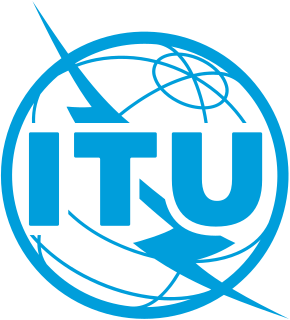Harmonisation or harmonize may refer to:
Harmonisation or harmonize may refer to:

The International Telecommunication Union is a specialized agency of the United Nations responsible for many matters related to information and communication technologies. It was established on 17 May 1865 as the International Telegraph Union, making it the oldest UN agency.

Internet slang is a non-standard or unofficial form of language used by people on the Internet to communicate to one another. An example of Internet slang is "LOL" meaning "laugh out loud". Since Internet slang is constantly changing, it is difficult to provide a standardized definition. However, it can be understood to be any type of slang that Internet users have popularized, and in many cases, have coined. Such terms often originate with the purpose of saving keystrokes or to compensate for small character limits. Many people use the same abbreviations in texting, instant messaging, and social networking websites. Acronyms, keyboard symbols, and abbreviations are common types of Internet slang. New dialects of slang, such as leet or Lolspeak, develop as ingroup Internet memes rather than time savers. Many people also use Internet slang in face-to-face, real life communication.

Justin Martyr, also known as Justin the Philosopher, was an early Christian apologist and philosopher.
Slang is vocabulary of an informal register, common in spoken conversation but avoided in formal writing. It also sometimes refers to the language generally exclusive to the members of particular in-groups in order to establish group identity, exclude outsiders, or both. The word itself came about in the 18th century and has been defined in multiple ways since its conception.

CENELEC is responsible for European standardization in the area of electrical engineering. Together with ETSI (telecommunications) and CEN, it forms the European system for technical standardization. Standards harmonised by these agencies are regularly adopted in many countries outside Europe which follow European technical standards. Although CENELEC works closely with the European Union, it is not an EU institution. Nevertheless, its standards are "EN" EU standards, thanks to EU Regulation 1025/2012.
A standards organization, standards body, standards developing organization (SDO), or standards setting organization (SSO) is an organization whose primary function is developing, coordinating, promulgating, revising, amending, reissuing, interpreting, or otherwise contributing to the usefulness of technical standards to those who employ them. Such an organization works to create uniformity across producers, consumers, government agencies, and other relevant parties regarding terminology, product specifications, protocols, and more. Its goals could include ensuring that Company A's external hard drive works on Company B's computer, an individual's blood pressure measures the same with Company C's sphygmomanometer as it does with Company D's, or that all shirts that should not be ironed have the same icon on the label.
An invoice, bill or tab is a commercial document issued by a seller to a buyer relating to a sale transaction and indicating the products, quantities, and agreed-upon prices for products or services the seller had provided the buyer.
The Harmonized Commodity Description and Coding System, also known as the Harmonized System (HS) of tariff nomenclature is an internationally standardized system of names and numbers to classify traded products. It came into effect in 1988 and has since been developed and maintained by the World Customs Organization (WCO), an independent intergovernmental organization based in Brussels, Belgium, with over 200 member countries.

The Harmonious Society is a socioeconomic concept in China that is recognized as a response to the increasing alleged social injustice and inequality emerging in mainland Chinese society as a result of unchecked economic growth, which has led to social conflict. The governing philosophy has therefore shifted around economic growth to overall societal balance and harmony. Along with a moderately prosperous society, it was set to be one of the national goals for the ruling vanguard Communist Party.
Tax harmonization is generally understood as a process of adjusting tax systems of different jurisdictions in the pursuit of a common policy objective. Tax harmonization involves the removal of tax distortions affecting commodity and factor movements in order to bring about a more efficient allocation of resources within an integrated market. Tax harmonization may serve alternative goals, such as equity or stabilization. It also can be subsumed, along with public expenditure harmonization, under the broader concept of fiscal harmonization. Narrowly defined, tax harmonization guided by this policy goal implies — under simplifying assumptions about other policy instruments and economic structure — convergence toward a more uniform effective tax burden on commodities or on factors of production. Convergence may be attained through the alignment of one or several elements that enter the determination of effective tax rates: the statutory tax rate and tax base, and enforcement practices. Perhaps the most widely accepted argument for harmonization involves convergence in the definition of product value or income for tax purposes. Such tax base harmonization would contribute to transparency for economic decision-making and, thus, to improved efficiency in resource allocation. In particular, a common income tax base for multinational companies operating in different jurisdictions would be instrumental not only in enhancing efficiency, but also in preventing overlaps or gaps in tax claims by different countries. Tax harmonization is an important part of the fiscal integration process. Fiscal integration is the process by which a group of countries agree on taking measures that lead to a higher level of fiscal convergence, the ultimate goal being the formation of a fiscal union. Tax harmonization doesn't automatically lead to the formation of a fiscal union, the second part involving much larger scale project that includes fiscal transfers, a fully harmonized legislation and maybe some supervising institutions, beside a long-run agreement. Starting from the definition given to the fiscal integration process, we can easily say that tax harmonization is the process by which a heterogeneous group of countries, federal states or even local governments agree on setting a minimum and maximum level of their tax rates, including also a higher degree of harmonization of tax legislation, in order to attract foreign investors and to encourage local development and investments.
In the European Union, harmonisation of law is the process of creating common standards across the internal market. Though each EU member state has primary responsibility for the regulation of most matters within their jurisdiction, and consequently each has its own laws, harmonisation aims to:
European tort law, as a term, is not strictly defined and is used to describe a number of various features concerning tort law in Europe. The concept developed alongside other major historic developments of European integration.

The European Union value-added tax is a value added tax on goods and services within the European Union (EU). The EU's institutions do not collect the tax, but EU member states are each required to adopt in national legislation a value added tax that complies with the EU VAT code. Different rates of VAT apply in different EU member states, ranging from 17% in Luxembourg to 27% in Hungary. The total VAT collected by member states is used as part of the calculation to determine what each state contributes to the EU's budget.
Policy laundering is the disguising of the origins of political decisions, laws, or international treaties. The term is based on the similar money laundering.
River crab and harmonious/harmonize/harmonization are Internet slang terms created by Chinese netizens in reference to the Internet censorship, or other kinds of censorship in China. In Mandarin Chinese, the word "river crab" (河蟹), which originally means Chinese mitten crab, sounds similar to "harmonious/harmonize/harmonization" in the word "harmonious society" (和谐社会), ex-Chinese leader Hu Jintao's signature ideology.
The splinternet is a characterization of the Internet as splintering and dividing due to various factors, such as technology, commerce, politics, nationalism, religion, and divergent national interests. "Powerful forces are threatening to balkanise it", writes the Economist weekly, and it may soon splinter along geographic and commercial boundaries. The Chinese government erected the "Great Firewall" for political reasons, and Russia has enacted the Sovereign Internet Law that allows it to partition itself from the rest of the Internet, while other nations, such as the US and Australia, discuss plans to create a similar firewall to block child pornography or weapon-making instructions.

Construction Products Directive (CPD) is a now repealed European Union Directive which aimed to remove technical barriers to trade in construction products between Member States in the European Union.

Regulation No. 305/2011 of the European Parliament and of the Council of the European Union is a regulation of 9 March 2011 that lays down harmonised conditions for the marketing of construction products and replaces Construction Products Directive (89/106/EEC). This EU regulation is designed to simplify and clarify the existing framework for the placing on the market of construction products.
The Baidu 10 Mythical Creatures, alternatively Ten Baidu Deities, was initially a humorous hoax from the interactive encyclopedia Baidu Baike which became a popular and widespread Internet meme in China in early 2009.
Harmonization is the process of minimizing redundant or conflicting standards which may have evolved independently.